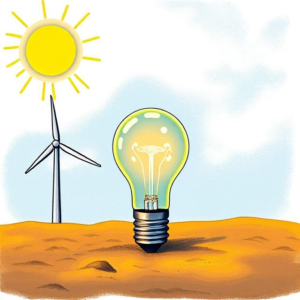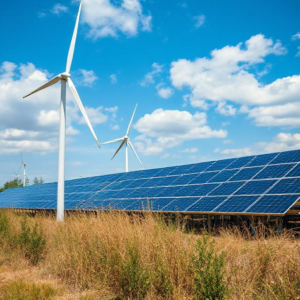What is Energy Conversion?
Energy conversion is the process of changing one form of energy into another. In everyday life, energy can exist in different forms, like heat, light, electricity, or motion. Energy conversion happens when we use one type of energy and change it into a more useful form. Energy conversion is simply the process of changing one type of energy (like chemical energy, mechanical energy, or heat) into another form that is useful to us, like light, motion, or electricity.
Example :
- converting wind into electricity with wind turbines or burning fuel to power a car.
- when you plug in a light bulb, electric energy is converted into light energy and heat energy. Or when you ride a bicycle, the energy from your muscles (chemical energy) is converted into motion energy (kinetic energy).

Types of Energy Forms and How They Are Converted :
- Mechanical Energy → Electric Energy:
- Example: A wind turbine converts the motion energy of wind into electric energy. The moving blades of the turbine spin a generator, which produces electricity.
- Chemical Energy → Heat or Light Energy:
- Example: In a car engine, the chemical energy stored in fuel (like gasoline) is burned to create heat energy, which then powers the car’s movement (kinetic energy).
- Electric Energy → Light Energy:
- Example: A light bulb converts electric energy into light energy. Some of the energy is also lost as heat.
- Solar Energy → Electric Energy:
- Example: Solar panels convert energy from the Sun (solar energy) into electric energy that can be used to power your home.
- Mechanical Energy → Heat Energy:
- Example: Friction between two surfaces converts mechanical energy (movement) into heat energy. This is why your hands get warm when you rub them together.
Why is Energy Conversion Important?
Energy conversion is important because it allows us to use energy in ways that are practical and useful. We rely on converting energy for everything, from turning on lights to powering cars to using electronic devices.
- Example 1: In a battery, chemical energy is converted into electrical energy to power devices like phones and flashlights.
- Example 2: In power plants, thermal energy (heat) from burning fuel is converted into electrical energy that powers homes, schools, and businesses.
Key Points about Energy Conversion
- Energy cannot be created or destroyed, but it can change from one form to another. This is called the law of conservation of energy.
- Some energy is always “lost” in the form of heat during energy conversions, which is why some processes are less efficient.
- Energy conversion helps us use different types of energy in ways that make our lives easier and more efficient.











